formerly eScholarship Editions


|
|
|
|
Your search for
'Politics' in subject
found 293 book(s). | Modify Search | Displaying 161 - 180 of 293 book(s) | |
| 161. | 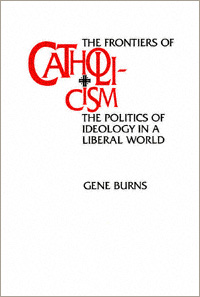 | Title: The frontiers of Catholicism: the politics of ideology in a liberal world Author: Burns, Gene 1958- Published: University of California Press, 1994 Subjects: Sociology | Religion | Social Theory | Gender Studies | Christianity | Politics Publisher's Description: Gene Burns examines the origins of contemporary diversity and conflict in the Catholic Church, illuminating as well the processes of ideological change. Similar Items |
| 162. |  | Title: The colonial Bastille: a history of imprisonment in Vietnam, 1862-1940 Author: Zinoman, Peter 1965- Published: University of California Press, 2001 Subjects: Asian Studies | Asian History | Southeast Asia | Politics Publisher's Description: Peter Zinoman's original and insightful study focuses on the colonial prison system in French Indochina and its role in fostering modern political consciousness among the Vietnamese. Using prison memoirs, newspaper articles, and extensive archival records, Zinoman presents a wealth of significant ne . . . [more] Similar Items |
| 163. | 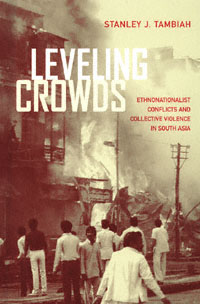 | Title: Leveling crowds: ethnonationalist conflicts and collective violence in South Asia Author: Tambiah, Stanley Jeyaraja 1929- Published: University of California Press, 1997 Subjects: Anthropology | South Asia | Politics | Asian History | Religion Publisher's Description: Ethno-nationalist conflicts are rampant today, causing immense human loss. Stanley J. Tambiah is concerned with the nature of the ethno-nationalist explosions that have disfigured so many regions of the world in recent years. He focuses primarily on collective violence in the form of civilian "riots" in South Asia, using selected instances in Sri Lanka, Pakistan, and India. He situates these riots in the larger political, economic, and religious contexts in which they took place and also examines the strategic actions and motivations of their principal agents. In applying a wide range of social theory to the problems of ethnic and religious violence, Tambiah pays close attention to the history and culture of the region.On one level this provocative book is a scrupulously detailed anthropological and historical study, but on another it is an attempt to understand the social and political changes needed for a more humane order, not just in South Asia, but throughout the world. [brief] Similar Items |
| 164. |  | Title: Losing face: status politics in Japan Author: Pharr, Susan J Published: University of California Press, 1992 Subjects: History | Asian Studies | Asian History | Japan | Politics Publisher's Description: How does a "homogeneous" society like Japan treat the problem of social inequality? Losing Face looks beyond conventional structural categories (race, class, ethnicity) to focus on conflicts based on differences in social status. Three rich and revealing case studies explore crucial asymmetries of a . . . [more] Similar Items |
| 165. |  | Title: Rethinking the American race problem Author: Brooks, Roy L. (Roy Lavon) 1950- Published: University of California Press, 1990 Subjects: American Studies | Law | Politics | Ethnic Studies Publisher's Description: If the conservative view of the American race problem is frightening, the traditional liberal view seems impotent. Analyzing the race problem from neither right nor left, Brooks sheds a new and clarifying light on America's longest running social and moral dilemma.This incisive book provides a bold new examination of the seemingly intractable racial problems confronting Americans at the end of the twentieth century. In a wide-ranging and probing study, Brooks calls into question the prevailing wisdom about racism, civil rights legislation, and the composition of the Black community, going on to offer a dramatic new approach to the race problem. In Brooks' mind, civil rights laws - laws targeted at racial discrimination - have not only failed to engender racial equality, but have in fact had a negative effect on the standard of living of many Blacks. Brooks defines the American race problem so as to carefully separate racial oppression from (economic) class oppression and explains how civil rights legislation since the 1960s has hurt Black Americans of every class. He offers a strategy for resolving the country's racial inequities, unique in its attentiveness to class division in Black society, that combines governmental remedies and an unprecedented program of Black self-help.While Brooks argues that the government has the means to resolve the race dilemma, he suggests that it lacks the spirit to do so. Thus, it may be time for Black Americans to come to grips with an unpleasant reality - namely, that they can count on the government only for minimal alleviation, and must take on the larger portion of responsibility for resolving the American race problem themselves.Certain to arouse controversy, Rethinking the American Race Problem offers new understandings of issues often clouded by misconceptions and backward notions. It is an important book for anyone concerned about the current state of race relations in America. [brief] Similar Items |
| 166. |  | Title: Solidarity of strangers: feminism after identity politics Author: Dean, Jodi 1962- Published: University of California Press, 1996 Subjects: Gender Studies | Postcolonial Studies | Women's Studies | Politics | Philosophy Publisher's Description: Solidarity of Strangers is a crucial intervention in feminist, multicultural, and legal debates that will ignite a rethinking of the meaning of difference, community, and participatory democracy. Arguing for a solidarity rooted in a respect for difference, Dean offers a broad vision of the shape of . . . [more] Similar Items |
| 167. | 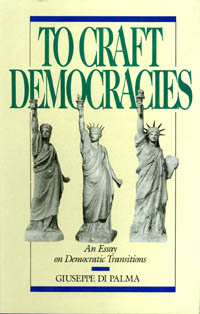 | Title: To craft democracies: an essay on democratic transitions Author: Di Palma, Giuseppe Published: University of California Press, 1990 Subjects: Politics | Russian and Eastern European Studies | History Publisher's Description: Is democracy a hot-house plant? Is it difficult to transplant it into new soil? The fall of so many dictatorships in the last few years - first in Southern Europe, then in Latin America, now in Eastern Europe - opens new, more optimistic perspectives on democratic development. The crises of dictatorships and the search for a new political order offer fertile ground for an examination of how best to effect democratic transitions.By focusing on the objective conditions that make democracy probable, sociological and historical theories of democracy often lose sight of what is possible. Here Giuseppe Di Palma instead explores those conciliatory political undertakings that political actors on all sides now engage in to make the improbable possible. His emphasis is on political crafting: in regard to constitutional choices, to alliances and convergences between contestants, to trade-offs, to the pacing of the transitions. Di Palma also examines the reasons - stalemate, the high cost of repression, a loss of goals, international constraints and inducements - that may motivate incumbents and nondemocratic political actors to accept democracy, even in those cases, as in Central America and Eastern Europe, where acceptance would seem least likely.An original and imaginative work that, in the light of recent transitions, challenges our assumptions about fledgling democracies and breaks new theoretical ground, To Craft Democracies will appeal to anyone interested in the way we forge our political communities today. [brief] Similar Items |
| 168. |  | Title: Republic of fear: the politics of modern Iraq Author: Makiya, Kanan Published: University of California Press, 1998 Subjects: Middle Eastern Studies | Politics | Middle Eastern History Publisher's Description: In 1968 a coup d'état brought into power an extraordinary regime in Iraq, one that stood apart from other regimes in the Middle East. Between 1968 and 1980, this new regime, headed by the Arab Ba'th Socialist party, used ruthless repression and relentless organization to transform the way Iraqis think and react to political questions. In just twelve years, a party of a few thousand people grew to include nearly ten percent of the Iraqi population.This book describes the experience of Ba'thism from 1968 to 1980 and analyzes the kind of political authority it engendered, culminating in the personality cult around Saddam Hussein. Fear, the author argues, is at the heart of Ba'thi politics and has become the cement for a genuine authority, however bizarre.Examining Iraqi history in a search for clues to understanding contemporary political affairs, the author illustrates how the quality of Ba'thi pan-Arabism as an ideology, the centrality of the first experience of pan-Arabism in Iraq, and the interaction between the Ba'th and communist parties in Iraq from 1958 to 1968 were crucial in shaping the current regime.Saddam Hussein's decision to launch all-out war against Iran in September 1980 marks the end of the first phase of this re-shaping of modern Iraqi politics. The Iraq-Iran war is a momentous event in its own right, but for Iraq, the author argues, the war diverts dissent against the Ba'thi regime by focusing attention on the specter of an enemy beyond Iraq's borders, thus masking a hidden potential for even greater violence inside Iraq. [brief] Similar Items |
| 169. |  | Title: Political protest and cultural revolution: nonviolent direct action in the 1970s and 1980s Author: Epstein, Barbara Published: University of California Press, 1991 Subjects: History | Politics | American Studies | United States History | Sociology Publisher's Description: From her perspective as both participant and observer, Barbara Epstein examines the nonviolent direct action movement which, inspired by the civil rights movement, flourished in the United States from the mid-seventies to the mid-eighties. Disenchanted with the politics of both the mainstream and the organized left, and deeply committed to forging communities based on shared values, activists in this movement developed a fresh, philosophy and style of politics that shaped the thinking of a new generation of activists. Driven by a vision of an ecologically balanced, nonviolent, egalitarian society, they engaged in political action through affinity groups, made decisions by consensus, and practiced mass civil disobedience.The nonviolent direct action movement galvanized originally in opposition to nuclear power, with the Clamshell Alliance in New England and then the Abalone Alliance in California leading the way. Its influence soon spread to other activist movements - for peace, non-intervention, ecological preservation, feminism, and gay and lesbian rights.Epstein joined the San Francisco Bay Area's Livermore Action Group to protest the arms race and found herself in jail along with a thousand other activists for blocking the road in front of the Lawrence Livermore Laboratory. She argues that to gain a real understanding of the direct action movement it is necessary to view it from the inside. For with its aim to base society as a whole on principles of egalitarianism and nonviolence, the movement sought to turn political protest into cultural revolution. [brief] Similar Items |
| 170. | 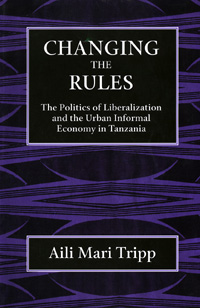 | Title: Changing the rules: the politics of liberalization and the urban informal economy in Tanzania Author: Tripp, Aili Mari Published: University of California Press, 1997 Subjects: Politics | Anthropology | African Studies | Economics and Business Publisher's Description: How are people in one of Africa's largest cities, Dar es Salaam, capable of surviving day to day when the downward decline of Tanzania's economy has become so pronounced that even high-ranking state employees receive among the lowest incomes in the country? In this impressively researched and highly original study, Aili Mari Tripp shows how the people of Dar es Salaam, through creativity and considerable ingenuity, supply for themselves the various goods and services that the government can no longer provide. With the growth of an informal economy, they have demonstrated resistance to state control, resulting in broad political, economic and social transformations within Tanzania. Moreover, the unprecedented participation of women in informal economic activities has had a profound effect on gender relations.Tripp incorporates in-depth interviews and a field survey conducted at the household and micro-enterprise level in examining the influence and impact of the urban informal economy on Tanzanian society. This informal sector encompasses the enterprises of masons, cooks, cobblers, and tailors; a dizzying myriad of market vendors; even educators and doctors. Tripp shows how the urban informal economy challenges state-defined bases of social justice with alternative notions of economic equity. Her work is an essential contribution to the study of African politics and state-society relations. [brief] Similar Items |
| 171. | 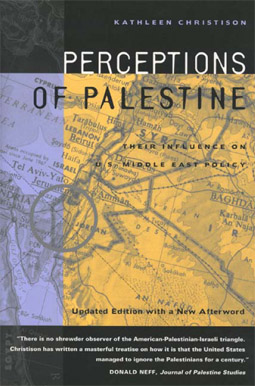 | Title: Perceptions of Palestine: their influence on U.S. Middle East policy Author: Christison, Kathleen 1941- Published: University of California Press, 1999 Subjects: Politics | Middle Eastern History | Middle Eastern Studies Publisher's Description: For most of the twentieth century, considered opinion in the United States regarding Palestine has favored the inherent right of Jews to exist in the Holy Land. That Palestinians, as a native population, could claim the same right has been largely ignored. Kathleen Christison's controversial new book shows how the endurance of such assumptions, along with America's singular focus on Israel and general ignorance of the Palestinian point of view, has impeded a resolution to the Arab-Israeli conflict. Christison begins with the derogatory images of Arabs purveyed by Western travelers to the Middle East in the nineteenth century, including Mark Twain, who wrote that Palestine's inhabitants were "abject beggars by nature, instinct, and education." She demonstrates other elements that have influenced U.S. policymakers: American religious attitudes toward the Holy Land that legitimize the Jewish presence; sympathy for Jews derived from the Holocaust; a sense of cultural identity wherein Israelis are "like us" and Arabs distant aliens. She makes a forceful case that decades of negative portrayals of Palestinians have distorted U.S. policy, making it virtually impossible to promote resolutions based on equality and reciprocity between Palestinians and Israelis. Christison also challenges prevalent media images and emphasizes the importance of terminology: Two examples are the designation of who is a "terrorist" and the imposition of place names (which can pass judgment on ownership). Christison's thoughtful book raises a final disturbing question: If a broader frame of reference on the Palestinian-Israeli conflict had been employed, allowing a less warped public discourse, might not years of warfare have been avoided and steps toward peace achieved much earlier? [brief] Similar Items |
| 172. | 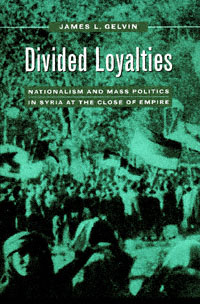 | Title: Divided loyalties: nationalism and mass politics in Syria at the close of Empire Author: Gelvin, James L 1951- Published: University of California Press, 1999 Subjects: History | Middle Eastern Studies | Middle Eastern History | Politics Publisher's Description: James L. Gelvin brings a new and distinctive perspective to the perennially fascinating topic of nationalism in the Arab Middle East. Unlike previous historians who have focused on the activities and ideas of a small group of elites, Gelvin details the role played by non-elites in nationalist politics during the early part of the twentieth century. Drawing from previously untapped sources, he documents the appearance of a new form of political organization - the popular committee - that sprang up in cities and villages throughout greater Syria in the immediate aftermath of the First World War. These committees empowered a new type of nationalist leadership, made nationalist politics a mass phenomenon for the first time, and articulated a view of nation and nationalism that continues to inform the politics of the region today.Gelvin does more than recount an episode in the history of nationalism in the Arab Middle East. His examination of leaflets, graffiti, speeches, rumors, and editorials offers fresh insights into the symbolic construction of national communities. His analysis of ceremonies - national celebrations, demonstrations, theater - contributes to our understanding of the emergence of mass politics. By situating his study within a broader historical context, Gelvin has written a book that will be of interest to all who wish to understand nationalism in the region and beyond. [brief] Similar Items |
| 173. | 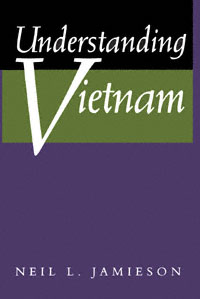 | Title: Understanding Vietnam Author: Jamieson, Neil L Published: University of California Press, 1995 Subjects: Anthropology | Politics | Cultural Anthropology | Asian History | Southeast Asia Publisher's Description: The American experience in Vietnam divided us as a nation and eroded our confidence in both the morality and the effectiveness of our foreign policy. Yet our understanding of this tragic episode remains superficial because, then and now, we have never grasped the passionate commitment with which the Vietnamese clung to and fought over their own competing visions of what Vietnam was and what it might become. To understand the war, we must understand the Vietnamese, their culture, and their ways of looking at the world. Neil L. Jamieson, after many years of living and working in Vietnam, has written the book that provides this understanding.Jamieson paints a portrait of twentieth-century Vietnam. Against the background of traditional Vietnamese culture, he takes us through the saga of modern Vietnamese history and Western involvement in the country, from the coming of the French in 1858 through the Vietnam War and its aftermath. Throughout his analysis, he allows the Vietnamese - both our friends and foes, and those who wished to be neither - to speak for themselves through poetry, fiction, essays, newspaper editorials and reports of interviews and personal experiences.By putting our old and partial perceptions into this new and broader context, Jamieson provides positive insights that may perhaps ease the lingering pain and doubt resulting from our involvement in Vietnam. As the United States and Vietnam appear poised to embark on a new phase in their relationship, Jamieson's book is particularly timely. [brief] Similar Items |
| 174. |  | Title: The state and the mass media in Japan, 1918-1945 Author: Kasza, Gregory James Published: University of California Press, 1993 Subjects: Politics | Public Policy | Japan | Asian History Publisher's Description: Gregory Kasza examines state-society relations in interwar Japan through a case study of public policy toward radio, film, newspapers, and magazines. Similar Items |
| 175. |  | Title: Managing the medical arms race: public policy and medical device innovation Author: Foote, Susan Bartlett Published: University of California Press, 1992 Subjects: Politics | Medicine | Public Policy | Economics and Business Publisher's Description: The allure of medical innovation is powerful - it holds out the promise of perfect health, the end of pain, the deferral of death. Our insatiable appetite for costly new technologies, fed by a profusion of innovations and the profits they generate, has led to what has been dubbed the medical arms race. During the last several decades government has been called upon to manage the escalation of this race.Foote has written the first comprehensive examination of the profound influence of government policies on medical innovation. She explains how these policies have proliferated to affect every stage of the innovative process in medical device technology - from the first research idea to the patient's bedside. Drawing on case studies of technologies as diverse as lasers, cardiac pacemakers, CT scanners, and IUDs, she traces the interaction between the industry and government institutions, including the National Institutes of Health, the FDA, and the Medicare and Medicaid programs.Public policies during the 1950s and 1960s, Foote discovers, tended to promote innovation, while the regulation and cost controls of the 1970s and 1980s began to inhibit it. For the 1990s and beyond she proposes incremental policy improvements that will rationalize and streamline government intervention. She cautions that we must recognize the limits of medical technology and public policy to cure all ills.Medical innovation is a crucial part of health care reform, a subject of increasing complexity and controversy. Written clearly and accessibly, Managing the Medical Arms Race is an invaluable source for medical, industry, and policy professionals, but it also has much to say to anybody concerned with how we as a society choose to take care of our health. [brief] Similar Items |
| 176. |  | Title: The nuclear seduction: why the arms race doesn't matter and what does Author: Schwartz, William A Published: University of California Press, 1989 Subjects: Politics | Sociology | Social Problems | Public Policy | Science Similar Items |
| 177. | 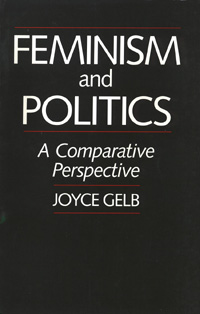 | Title: Feminism and politics: a comparative perspective Author: Gelb, Joyce 1940- Published: University of California Press, 1989 Subjects: Politics | Gender Studies | European Studies | Public Policy Publisher's Description: This incisive work provides a comparative political analysis of the women's movement in England, the United States, and Sweden from the 1960s to the present. Based on extensive interviews in each of the three countries, Feminism and Politics focuses not only on the internal dynamics of the movements themselves, but also on the relationship of feminist politics to the political process as a whole and to the economic and ideological context.Gelb finds that differences in the feminist movements in each country relate to systemic and cultural differences. In Britain the closed nature of the political system has greatly narrowed opportunities for feminist political activities. By contrast, the feminist movement in the United States has enjoyed relative autonomy and success, primarily because it has been unconstrained by the necessity of working through existing groups such as unions and political parties. In Sweden Gelb finds an anomalous situation in which the state has implemented many feminist policies but has allowed little ideological or political space for an autonomous movement.In its scope and analysis, Feminism and Politics offers a valuable new perspective on women's political activities. [brief] Similar Items |
| 178. |  | Title: Islam, politics, and social movements Author: Burke, Edmund 1940- Published: University of California Press, 1990 Subjects: History | Middle Eastern History | Middle Eastern Studies | Politics Publisher's Description: Taken together the essays in this work not only provide new research essential to the study of Islamic societies and Muslim peoples, but also set a new standard for the concrete study of local situations and illuminate the forces shaping the history of modern Muslim societies.This collection is unique in its sophisticated interpretation of the social protest and political resistance movements in Muslim countries during the nineteenth and twentieth centuries. The contributors take two principal approaches to the study of their subject. Utilizing "new cultural history," they explore how particular movements have deployed the cultural and religious resources of Islam to mobilize and legitimize insurgent political action. Others rely on "new social history" to study the economic, political, and social contexts in which movements of anti-colonial resistance and revolution have developed. This work brings together contributions from specialists on Islamic North Africa, Egypt, the Arab fertile crescent, Iran and India. [brief] Similar Items |
| 179. | 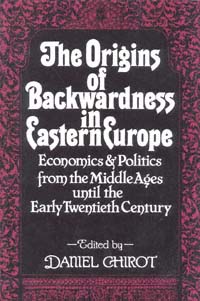 | Title: The origins of backwardness in Eastern Europe: economics and politics from the Middle Ages until the early twentieth century Author: Chirot, Daniel Published: University of California Press, 1989 Subjects: History | European History | Politics | Economics and Business Publisher's Description: Reaching back centuries, this study makes a convincing case for very deep roots of current Eastern European backwardness. Its conclusions are suggestive for comparativists studying other parts of the world, and useful to those who want to understand contemporary Eastern Europe's past. Like the rest of the world except for that unique part of the West which has given us a false model of what was "normal," Eastern Europe developed slowly. The weight of established class relations, geography, lack of technological innovation, and wars kept the area from growing richer.In the nineteenth century the West exerted a powerful influence, but it was political more than economic. Nationalism and the creation of newly independent aspiring nation-states then began to shape national economies, often in unfavorable ways.One of this book's most important lessons is that while economics may limit the freedom of action of political players, it does not determine political outcomes. The authors offer no simple explanations but rather a theoretically complex synthesis that demonstrates the interaction of politics and economics. [brief] Similar Items |
| 180. | 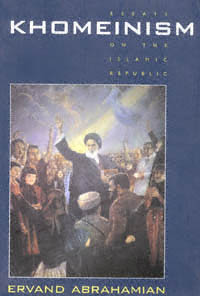 | Title: Khomeinism: essays on the Islamic Republic Author: Abrahamian, Ervand 1940- Published: University of California Press, 1993 Subjects: History | Politics | Middle Eastern History | Middle Eastern Studies Publisher's Description: "Fanatic," "dogmatic," "fundamentalist" - these are the words most often used in the West to describe the Ayatollah Khomeini. The essays in this book challenge that view, arguing that Khomeini and his Islamic movement should be seen as a form of Third World political populism - a radical but pragmatic middle-class movement that strives to enter, rather than reject, the modern age.Ervand Abrahamian, while critical of Khomeini, asks us to look directly at the Ayatollah's own works and to understand what they meant to his principal audience - his followers in Iran. Abrahamian analyzes political tracts dating back to 1943, along with Khomeini's theological writings and his many public statements in the form of speeches, interviews, proclamations and fatwas (judicial decrees). What emerges, according to Abrahamian, is a militant, sometimes contradictory, political ideology that focuses not on issues of scripture and theology but on the immediate political, social, and economic grievances of workers and the middle class.These essays reveal how the Islamic Republic has systematically manipulated history through televised "recantations," newspapers, school textbooks, and even postage stamps. All are designed to bolster the clergy's reputation as champions of the downtrodden and as defenders against foreign powers. Abrahamian also discusses the paranoia that permeates the political spectrum in Iran, contending that such deep distrust is symptomatic of populist regimes everywhere. [brief] Similar Items |